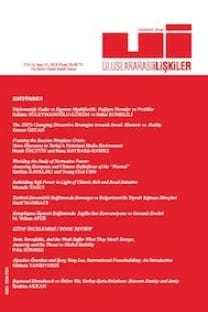SSCB Sonrası Dönemde Türkiye-Ermenistan İlişkileri
SSCB sonrasında Türkiye’nin dış politikasında yeni bir açılım fırsatı karşısına çıktı: Kafkasya. Bu bölgede ve özellikle üç bağımsız devletten oluşan Güney Kafkasya’da, Türkiye için en kritik ve hassas konumdaki ülke ise Ermenistan’dı. Türkiye Ermenistan ilişkileri, geçmişten gelen olumsuz mirasa rağmen, SSCB sonrasında kısmen de olsa farklı bir düzleme getirilmek istendi. Bu doğrultuda Petrosyan döneminde iki tarafın da olumlu girişimleri görüldü, fakat bu süreçte ortaya çıkan Yukarı Karabağ sorunu ilişkileri belirler hale geldi. Halefi Koçaryan döneminde, Yukarı Karabağ sorununun yanında Diaspora’nın etkisi arttı ve yine buna bağlı olarak sözde “soykırım” konusu gerek ikili ilişkilerde gerekse uluslararası platformlarda daha fazla gündeme getirilmeye başlandı. Türkiye ile ilişkilerin bozulacağı düşünülen Koçaryan döneminde şahin bir söylemle yola çıkılmasına rağmen özellikle ikinci başkanlık döneminde bir yumuşama yaşandı. Resmi ilişkilerin ve görüşmelerin dışında, ikili ilişkilerde olumlu, barışçı ve önyargısız bir ortam sağlamak için 2001’de kurulan Türk-Ermeni Barış Komisyonu önemli bir adım olarak kabul edildi.
Anahtar Kelimeler:
Koçaryan, Yukarı Karabağ, Türk-Ermeni Barış Komisyonu, Diaspora, Petrosyan
Turkish-Armenian Relations in the Aftermath of the USSR
Following the collapse of the USSR, Turkey acquired a new opportunity concerning its foreign policy: Caucasus. In this whole region and especially in the southern Caucasus composed of three independent states, Armenia occupied the most critical and the most sensitive issue. Turkey, despite the historical negative legacy, tried to establish a different base for its relations with Armenia, succeeding the dissolution of the Soviet Union. According to this, it is possible to observe positive steps undertaken by the two sides under the presidency of Petrosian, but the Nagorno- Karabakh question became the decisive factor of the bilateral relations during this same period. During the presidency of his successor Kocharian, other than Nagorno-Karabakh problem, Diaspora communities gained influence. This led the so-called "genocide" issue to constitute an important subject of the international agenda in bilateral relations as well as in other international platforms. Despite the Kocharian's hawkish rhetoric in the beginning, which caused the deterioration of the bilateral relations, during the second term of his presidency, a certain détente has been observed. Apart from official relations and negotiations, the Turkish-Armenian Peace Commission, founded in 2001 with the intention to establish a positive, peaceful and free of prejudice platform constitutes an important step.
Keywords:
Diaspora, Kocaryan, Petrosyan, Nagorno Karabakh,
___
- ....
- ISSN: 1304-7310
- Başlangıç: 2004
- Yayıncı: Uluslararası İlişkiler Konseyi Derneği İktisadi İşletmesi
Sayıdaki Diğer Makaleler
Bağımsızlıktan Günümüze Türkiye-Tacikistan İlişkileri
Avrupa Anayasası’nı Tercih Nedenleri
Rejim Teorileri İnsan Hakları Sorunlarının İncelenmesinde Yararlı Çerçeveler midir?
SSCB Sonrası Dönemde Türkiye-Ermenistan İlişkileri
Türk Dış Politikası’nda Avrasya Seçeneği
Türkiye’de Kafkas Diyasporası ve Türk Dış Politikası’na Etkileri
